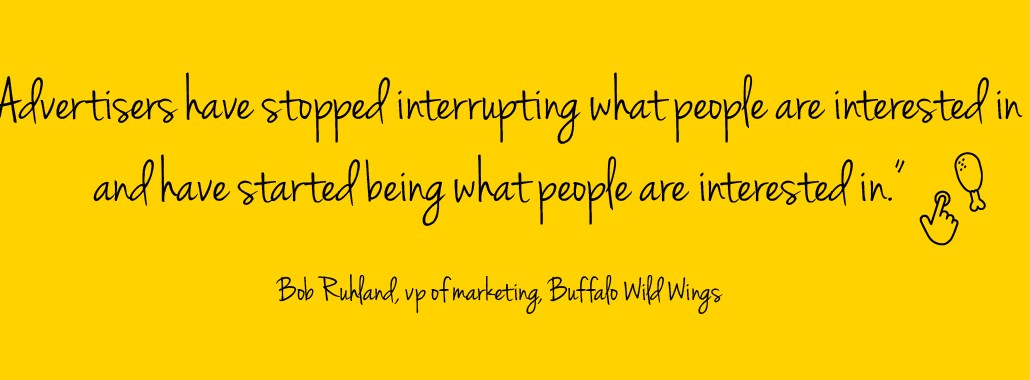Secure your place at the Digiday Media Buying Summit in Nashville, March 2-4

This is ThinkTank, a series in which we quiz brand chiefs and CMOs on where the industry is heading.
The longstanding motto for Buffalo Wild Wings — “Wings. Beer. Sports.” — is also the recipe for the chain’s continual success.
With a focus on sports, food and “everything in between,” B-Dubs, as it is known by its fans, has succeeded in engaging its audience through television, social, digital as well as in-restaurant experiences. Sales at Buffalo Wild Wings’ company-owned and franchised stores grew about 6 percent last year, according to NPD Group.
While its restaurants once attracted young sports fans with cable and satellite channels, now they draw them in with experiential campaigns around some of the biggest sporting events of the year, be it March Madness or Fantasy Football. As Fantasy Football preparation ramps up ahead of the NFL season kickoff, it recently unveiled a new social and digital campaign that lets fans create custom team logos and even generate team names for fantasy football team owners.
“We want to solidify ourselves as an iconic sports brand in the restaurant space, and we feel a sense of immediacy to do it now,” Bob Ruhland, Buffalo Wild Wings’ vp of marketing, told Digiday in a wide-ranging discussion. Excerpts:
How do you differentiate in the “sports experience” market?
Our point of difference has always been the experience within the restaurant. And it’s just natural for us to build an experience around sports, because we like to bill ourselves as the ultimate experience for sports fans. Thinking of ourselves as the sports fan’s biggest fan and being for all sports fans, we feel that it is an opportunity to really differentiate us from all competitors. We want to solidify ourselves as an iconic sports brand in the restaurant space, and we feel a sense of immediacy to do it now.
Why?
There’s always competitors out there, and we feel that this is a very preferred position. Everyone wants to be the restaurant of choice among MVP sports fans, and we just want to make sure that we continue to provide our guests everything they’re looking for in terms of a sports experience.
How do you reach those sports fans?
If you want to know more about our offerings throughout the day, we’ll communicate that to you through radio. And if you are somebody that wants to engage with the brand at a different level and live the brand much more — as millennials do in a first-person-experience kind of way — we want to be there for them through their chosen method of communication. What’s happened with social and digital media across the industry is that advertisers have stopped interrupting what people are interested in and have started being what people are interested in.
Millennials are interested in advertising?
Because they’re active socially, and they’re technically advanced, communicating with them electronically and socially is important for us. It also allows to embed ourselves around the experience with sports and within the whole idea of the second screen. The fact that we’re able to communicate with them by direct proximity to these sports events matters. It is also their preferred language of communication.
Talk about the idea of the “guest captain” and how it’s different from a typical restaurant host.
Probably the most frustrating thing for guests in general is not getting their food in a timely fashion, not being able to pay their bill when they want to leave. That is so important for us at Buffalo Wild Wings that we wanted to have this captain position to do all those other things that build that experience better than any other brands. The position is like the host of any party. Anything that you need — let’s say you haven’t sampled some of the sauces — the captain can do that. It’s just an opportunity for us to go a little deeper with the community than our competitors.
Buffalo Wild Wings introduced a beer-themed menu for the summer in collaboration with the Boston Beer Company. What do partnerships like that do for you?
Collaboration among brands is good, particularly in the restaurant space. What you’re trying to do is capture some of the brand equity that some of these brands have with their consumers and leverage that within a B-Dubs experience. That’s always a positive. It’s something we’ll continue to do, within reason. There’s a possibility of partnerships with other sports brands too, I’m not sure what that would look like today, but we would definitely be interested in exploring that too.
More in Marketing

WTF are tokens?
When someone sends a prompt or receives a response, the system breaks language into small segments. These fragments are tokens.

AI is changing how retailers select tech partners
The quick rise of artificial intelligence-powered tools has reshaped retailers’ process of selecting technology partners for anything from marketing to supply chain to merchandising.

YouTube’s upmarket TV push still runs on mid-funnel DNA
YouTube is balancing wanting to be premium TV, the short-form powerhouse and a creator economy engine all at once.





